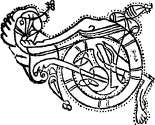
Druids

RUIDS next claim consideration. One modern writer tells us that the Druids were "magicians and nothing more." Magicians, yes; "and nothing more" must be rejected. The popular view of what they were is more nearly accurate than this. The druids were much more. They were above all things the priests of such religion as existed; and in that character were quite as highly venerated and as influential in Ireland as Caesar found them in Gaul. Their religion, if their many strange and conflicting views and practices may be considered as one system and called a religion, was, to our minds, degraded and degrading, and their ceremonies may appear to us silly or worse; we may think Crom Cruach very unworthy of worship; but what does all this matter if that religion was dear to the people as the essence of a spiritual life and the prime requisite for attaining eternal happiness and glory, and if it yielded to its adherents any of the consolations which religion affords and for which the human heart yearns?
It cannot be doubted that in Ireland, as in Gaul, the most learned, the most sage, and the most virtuous men of the nation were druids or priests of that religion. Their superior learning enabled them to become more than priests; magicians if you will, but certainly philosophers, astronomers, judges, bards, literary men, musicians, physicians, seers or diviners of future events, and many other things, and may have given them a choice, almost a monopoly, of all the offices which required learning. Their magic consisted mainly in their superior knowledge in times of general simplicity; and I think they deserve to be called a learned priesthood. In those circumstances most of the brehons, perhaps nearly all, were druids; but all druids were not brehons, for the office of brehon was but one of a choice of accessory offices which their learning opened to the druids. This seems to account sufficiently for the connection of the druids with the law, and for the apparent opinion of the writers of old that the terms druid and brehon might be used interchangeably.
It is impossible now to determine whether at any time the office of brehon was restricted to the druids as an exclusive legal priesthood. Probably there never was a positive restriction, but only the practical one involved in the requirement of learning, which few laymen could then satisfy. But the administration of the law not being the special function of the druids as such, but only a sort of secondary string to their bow, they may be supposed to have bestowed more attention upon whatever their special function was than upon law. The law remained in the Bearla Feini, the old classical Gaelic in which it had been originally composed, and constituted a large and important part of the Filidecht or higher academic course through which both druids and bards should pass, and in which they should attain a certain standard of proficiency before being admitted to their respective professions. As that old language gradually became antiquated the laws became less accessible and less intelligible to others than those learned men; and yet the school knowledge of it, which had sufficed for them and was little more than an accomplishment, did not always enable them to deal satisfactorily with the legal difficulties of everyday life. It is easy to conceive that in such circumstances the law may sometimes have failed in its primary object of bringing justice home to the people. An evident want arose.
The combined effect of the negligence of those two classes of men and the growing importance of law must have made it clear that the administration of justice ought not to be secondary to anything, but deserved the special and exclusive study of a distinct profession. To this profession laymen applied themselves in increasing numbers as the druids withdrew, until the administration of the law had got almost wholly into non-sacerdotal hands. Not being occupied with religion or with any other profession, nor hampered with the trivial formalities which the sacerdotal mind has always been so prone to create and magnify, these men could breathe a freer air, enter more sympathetically into the views and feelings of both parties to a suit, and arrive at a decision more satisfactory to both, than is as a rule possible to men who, though in the world, are best when they are not of it.
In Rome also the pagan priests were the earliest judges and custodians of the law. They greatly hampered its justice and its efficiency by the invention of useless technicalities, until at length, in 451 B.C., the Romans resolved to reduce their laws into a written and fixed form, and called upon the priests to produce the laws for that purpose; when, lo, it was found that the priests, after all, really had no substantive laws to produce, that they had completely lost what it had been their business and their pretence to guard, and had guarded nothing but their own technical inventions, mainly concerned with mere procedure (or its prevention), and mainly detrimental to the free flow of justice. Hence the Romans in drawing up their Twelve Tables were obliged to resort to laymen of common-sense, and even to consult neighbouring nations as to the very rudiments of law.
